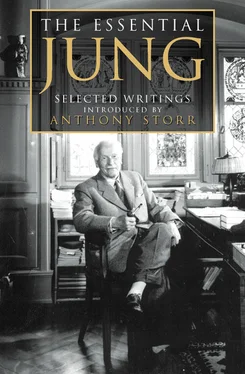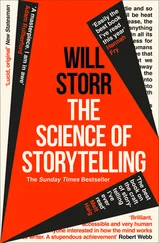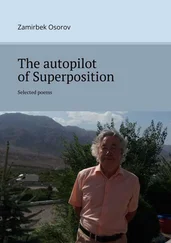I will give you other instances. Many years ago, when I was quite a young doctor, an old professor of criminology asked me about the experiment and said he did not believe in it. I said: “No, Professor? You can try it whenever you like.” He invited me to his house and I began. After ten words he got tired and said: “What can you make of it? Nothing has come of it.” I told him he could not expect a result with ten or twelve words; he ought to have a hundred and then we could see something. He said: “Can you do something with these words?” I said: “Little enough, but I can tell you something. Quite recently you have had worries about money, you have too little of it. You are afraid of dying of heart disease. You must have studied in France, where you had a love affair, and it has come back to your mind, as often, when one has thoughts of dying, old sweet memories come back from the womb of time.” He said: “How do you know?” Any child could have seen it! He was a man of 72 and he had associated heart with pain – fear that he would die of heart failure. He associated death with to die – a natural reaction – and with money he associated too little, a very usual reaction. Then things became rather startling to me. To pay, after a long reaction time, he said La Semeuse, though our conversation was in German. That is the famous figure on the French coin. Now why on earth should this old man say La Semeuse? When he came to the word kiss there was a long reaction time and there was a light in his eyes and he said: Beautiful. Then of course I had the story. He would never have used French if it had not been associated with a particular feeling, and so we must think why he used it. Had he had losses with the French franc? There was no talk of inflation and devaluation in those days. That could not be the clue. I was in doubt whether it was money or love, but when he came to kiss/beautiful I knew it was love. He was not the kind of man to go to France in later life, but he had been a student in Paris, a lawyer, probably at the Sorbonne. It was relatively simple to stitch together the whole story.
Jung soon began to link the idea of complexes with that of “unconscious personalities.”
From “A Review of the Complex Theory”CW 8, pars. 200–3
So far, I have purposely avoided discussing the nature of complexes, on the tacit assumption that their nature is generally known. The word “complex” in its psychological sense has passed into common speech both in German and in English. Everyone knows nowadays that people “have complexes.” What is not so well known, though far more important theoretically, is that complexes can have us. The existence of complexes throws serious doubt on the naïve assumption of the unity of consciousness, which is equated with “psyche,” and on the supremacy of the will. Every constellation of a complex postulates a disturbed state of consciousness. The unity of consciousness is disrupted and the intentions of the will are impeded or made impossible. Even memory is often noticeably affected, as we have seen. The complex must therefore be a psychic factor which, in terms of energy, possesses a value that sometimes exceeds that of our conscious intentions, otherwise such disruptions of the conscious order would not be possible at all. And in fact, an active complex puts us momentarily under a state of duress, of compulsive thinking and acting, for which under certain conditions the only appropriate term would be the judicial concept of diminished responsibility.
What then, scientifically speaking, is a “feeling toned complex”? It is the image of a certain psychic situation which is strongly accentuated emotionally and is, moreover, incompatible with the habitual attitude of consciousness. This image has a powerful inner coherence, it has its own wholeness and, in addition, a relatively high degree of autonomy, so that it is subject to the control of the conscious mind to only a limited extent, and therefore behaves like an animated foreign body in the sphere of consciousness. The complex can usually be suppressed with an effort of will, but not argued out of existence, and at the first suitable opportunity it reappears in all its original strength. Certain experimental investigations seem to indicate that its intensity or activity curve has a wavelike character, with a “wave-length” of hours, days, or weeks. This very complicated question remains as yet unclarified.
We have to thank the French psychopathologists, Pierre Janet in particular, for our knowledge today of the extreme dissociability of consciousness. Janet and Morton Prince both succeeded in producing four to five splittings of the personality, and it turned out that each fragment of personality had its own peculiar character and its own separate memory. These fragments subsist relatively independently of one another and can take one another’s place at any time, which means that each fragment possesses a high degree of autonomy. My findings in regard to complexes corroborate this somewhat disquieting picture of the possibilities of psychic disintegration, for fundamentally there is no difference in principle between a fragmentary personality and a complex. They have all the essential features in common, until we come to the delicate question of fragmented consciousness. Personality fragments undoubtedly have their own consciousness, but whether such small psychic fragments as complexes are also capable of a consciousness of their own is a still unanswered question. I must confess that this question has often occupied my thoughts, for complexes behave like Descartes’ devils and seem to delight in playing impish tricks. They slip just the wrong word into one’s mouth, they make one forget the name of the person one is about to introduce, they cause a tickle in the throat just when the softest passage is being played on the piano at a concert, they make the tiptoeing latecomer trip over a chair with a resounding crash. They bid us congratulate the mourners at a burial instead of condoling with them, they are the instigators of all those maddening things which F. T. Vischer attributed to the “mischievousness of the object.” They are the actors in our dreams, whom we confront so powerlessly; they are the elfin beings so aptly characterized in Danish folklore by the story of the clergyman who tried to teach the Lord’s prayer to two elves. They took the greatest pains to repeat the words after him correctly, but at the very first sentence they could not avoid saying: “Our Father, who art not in heaven.” As one might expect on theoretical grounds, these impish complexes are unteachable.
I hope that, taking it with a very large grain of salt, no one will mind this metaphorical paraphrase of a scientific problem. But even the soberest formulation of the phenomenology of complexes cannot get round the impressive fact of their autonomy, and the deeper one penetrates into their nature – I might almost say into their biology – the more clearly do they reveal their character as splinter psyches. Dream psychology shows us as plainly as could be wished how complexes appear in personified form when there is no inhibiting consciousness to suppress them, exactly like the hobgoblins of folklore who go crashing round the house at night. We observe the same phenomenon in certain psychoses when the complexes get “loud” and appear as “voices” having a thoroughly personal character.
In 1907, Jung published The Psychology of Dementia Praecox (the current name for what is now called schizophrenia). He sent the book to Freud, and it was this which led to Freud’s invitation to Jung to visit him in Vienna. Jung retained an interest in schizophrenia throughout his life, and wrote a paper on the condition as recently as 1957, only four years before his death.
Читать дальше












